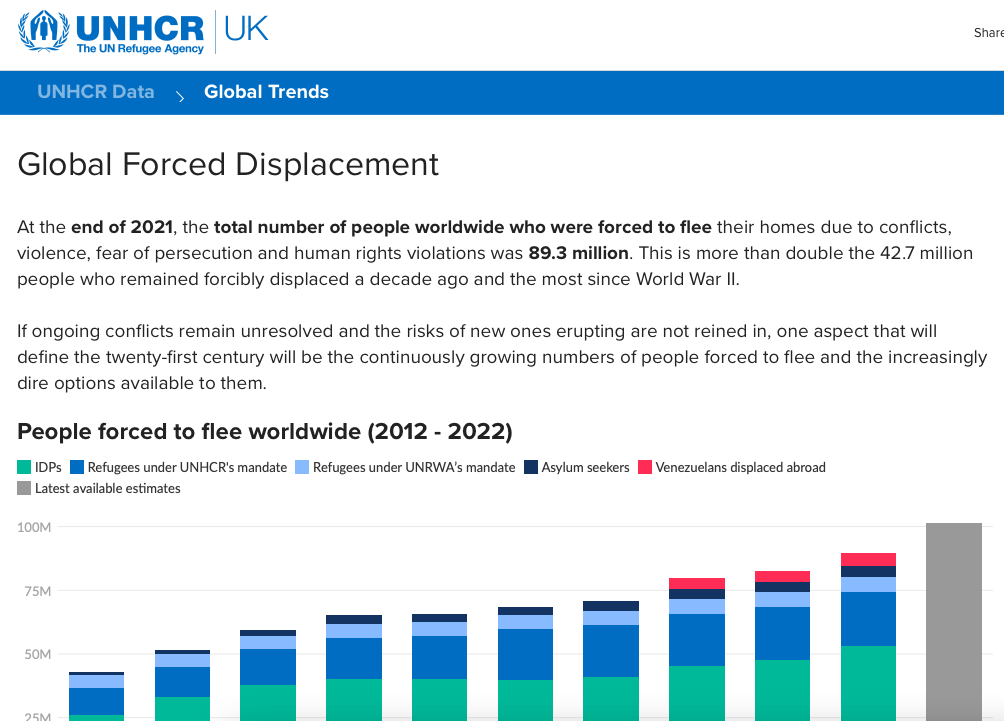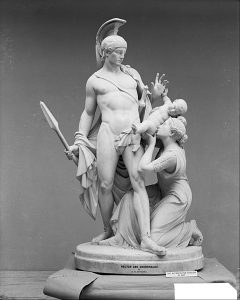Migration
Migration has been a constant feature of human history, all over the globe. And Classics is full of examples, both of voluntary movement and of forced displacement – and, of course, everything on the spectrum in between. As Professor Elena Isayev has pointed out (in ‘Hospitality, A Timeless Measure of Who We Are?‘ and Migration, Mobility and Place in Ancient Italy), mobility was the norm not the exception in antiquity. This is reflected in some of the best-known texts in the Classical canon: while Homer’s Odyssey centres around its Greek hero’s long journey home from the Trojan war, Virgil’s Aeneid follows the fortunes of a refugee from Troy (Aeneas) and his efforts to find a new place to call/make home.
Odysseus and Aeneas were far more privileged migrants than most refugees today. The UNHCR estimates that there are currently 100 million people experiencing forced displacement around the world, many as a result of conflict, persecution or human rights abuses. In the UK at present, people seeking entry to the country have been declared ‘not welcome’ by the government, whose hostile anti-immigration policies are matched with toxic anti-immigration rhetoric. Those who do brave terrifying Channel crossings or reach the UK by other means, find themselves in a challenging and often lengthy processing system: asylum applications currently take approximately 2-3 years to be reviewed, and while they wait applicants do not usually have the right to work, which means that they often struggle to support themselves. Added to that, migrants often face xenophobia and anti-immigrant feeling, whipped up by both politicians and the media.

As our reading and guest lecturers pointed out, the ways in which we tend to talk about migration are often clinical, focused more on statistics than personal voices and experiences. By looking at migration in the ancient world, we can discover a plethora of narratives and experiences that can help reinvigorate interest in modern issues and generate empathy and understanding. Differences between ancient and modern discourses and experiences of migration are also instructive because (as Elena Isayev explained to us) they can help unsettle assumptions and challenge preconceptions. As Dr Lina Fadel notes in a recent podcast on this topic, we are not experiencing a ‘migration crisis’ as such but rather a ‘crisis of storytelling’ around migration – and this is something that Applied Classics can help address.
We have been very inspired by the Applied Classics projects which Professor Elena Isayev has been running, and we strongly recommend reading her brilliant article on ‘Between Hospitality and Asylum: a historical perspective on displaced agency‘ as an excellent example of how ancient material enhance how we think about and address this modern challenge. You also can hear Prof. Isayev discuss her ‘Applied Classics’ work in this podcast, which was recorded for a project being run by the Visualising War and Peace project, looking specifically at how we visualise forced migration.
We hope that you enjoy browsing the posts below. They outline just some of the ways in which students at St Andrews have begun using ancient material to reflect on modern aspects of migration.
The Hospes Project
In 2022, a group of three students, Chloe Dabbs, India Goodman and Anna Pilgrim, developed The Hospes Project. The project uses the power of storytelling and the ‘draw’ of Classical antiquity to raise awareness about modern migration experiences and to address toxic rhetoric and anti-immigrant sentiments in the UK and beyond. You can explore our… Read More
Women, War and Displacement in Antiquity
Undergraduate Research Assistant Holly Axford has been researching ancient narratives of displacement. In this blog, she writes about the representation of women displaced by war in Ancient Greek epic and tragedy. ‘By means of such genres as theatre, including puppetry and shadow theatre, dance drama, and professional story-telling, performances are presented which probe a community’s… Read More
Experiences of Migration in Classical Antiquity
Undergraduate Research Assistant Holly Axford has been researching ancient narratives of displacement. In this blog she writes about ancient attitudes to supplication and hospitality, and how class and gender impacted on ancient experiences of migration and forced displacement. Individuals and groups in the ancient world left their native lands and sought shelter elsewhere, either temporarily… Read More
Ancient migration narratives
When we look back to the ancient world, it is important that we are not doing so just to avoid looking around. I agree with Dan-el Padilla Peralta that looking to antiquity can be productive in creating a cycle in which our present informs our reading of the past and, in turn, our new perspective on the past informs our present. Read More



